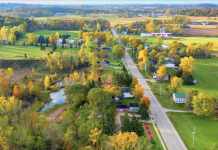[ad_1]
MATAMOROS, Mexico — Aurora Leticia Cruz has tried to maintain up together with her blood strain medicine since fleeing Guatemala greater than a yr in the past, however the limbo she finds herself in — caught in a sprawling camp on the Texas border after traversing Mexico — has made that onerous.
When Cruz felt woozy on a latest day as her blood strain skyrocketed, it may have resulted in tragedy, leaving her 17-year-old granddaughter and two great-grandchildren underneath 3 alone within the camp in Matamoros. However as a substitute, a nurse practitioner from Oregon and a Cuban physician, who like Cruz is awaiting U.S. asylum proceedings, have been capable of pull up her medical file and prescribe the right dosage.
The well being care employees who helped Cruz are with World Response Administration, a nonprofit that’s making an attempt to transcend mere disaster response and construct a system to make it simpler to trace the well being of migrants alongside their journey from Central America to the U.S. border. Cruz’s medical file was created in June by the group, which has been gathering affected person info.
“I envision this as a relay race by which we’re passing the medical baton to different suppliers as folks work their manner north,” mentioned Blake Davis, a paramedic from Maine who volunteers for the group.
The efforts are a part of a rising pattern in humanitarian help that has accelerated amid the coronavirus pandemic, which has highlighted the difficulties in getting fundamental well being care to migrants. With public hospitals overwhelmed by virus instances, migrants with coronary heart situations or problematic pregnancies have nowhere to go. Others have been prescribed ineffective drugs as a result of a altering array of medical doctors are compelled to deal with them with none medical historical past.
———
The Related Press produced this story with help from the Options Journalism Community, a nonprofit group devoted to reporting about responses to social issues.
———
Led by U.S. army veterans, World Response Administration is staffed by volunteers primarily from the U.S. and paid asylum seekers who have been medical professionals of their homelands. The group has handled hundreds of migrants over the previous yr at two clinics in Matamoros, together with one contained in the camp.
Medics with the group have innovated to carry care to the austere setting, constructing on what they discovered from the group’s work with displaced folks in international locations comparable to Bangladesh and Iraq.
They’ve used telemedicine to seek the advice of specialists in the USA and related a transportable gadget to an iPhone to carry out a sonogram. They’ve additionally labored with native leaders within the camp to regulate the unfold of the coronavirus by encouraging masks carrying, rising the variety of hand-washing stations and establishing an isolation space. Just one individual from the camp has been hospitalized with the virus, whilst medical amenities within the space struggled to maintain up with contaminated sufferers this summer season.
However the group’s objective is not only to take care of migrants as soon as they attain the border. It needs to supply well being care alongside the routes migrants take.
“Humanitarian help must be considered in a unique gentle,” mentioned govt director Helen Perry, an Military Reserve nurse.
It’s unsure how lengthy the camp will even exist since U.S. President-elect Joe Biden has pledged to undo the Trump administration coverage often called Stay in Mexico, which has compelled tens of hundreds of asylum seekers to attend throughout the border whereas their instances are thought of by U.S. courts.
Regardless, there’ll proceed to be folks fleeing violence and poverty in Central America, and help businesses are attempting to determine find out how to shield them.
Davis, the paramedic from Maine, plans to arrange a clinic subsequent yr in Tapachula, on Mexico’s southern border. He not too long ago flew in a helicopter over the remoted terrain migrants traverse in Guatemala to view the problem medical groups would face in treating folks in transit.
“There may be nothing on the market for them to get assist,” Davis mentioned. “We would like to have the ability to fill that void.”
The group is working to attach migrants to well being care and different assets by asking them what they want by way of WhatsApp. The thought is to make contact as early as doable with migrants, deal with their well being issues earlier than they worsen, and create a system the place their information could be accessed by medical doctors alongside the best way.
It’s a daunting activity that can require discovering the migrants, lots of whom are attempting to keep away from detection, and successful their belief. The group’s members additionally should get authorities officers on board.
And so they should tread fastidiously, so the well being knowledge can’t be used towards the migrants. As they do in Matamoros, the group will label every file with a quantity, somewhat than a reputation.
Different help teams are additionally tackling the problem.
The Worldwide Rescue Committee subsequent month is formally launching InfoDigna, an interactive map in Mexico that connects migrants to shelters, well being care suppliers and different providers wherever they’re. It’s going to supply reside chats to reply migrants’ questions on every part from the newest COVID-19 restrictions to the standing of immigration court docket operations.
InfoDigna is a part of the group’s world digital info service, which informs asylum seekers from Italy to Colombia by way of sensible telephones.
“It meets folks the place they’re at,” mentioned Edith Tapia, who coordinates the hassle in Mexico.
The organizations are moving into a niche that the World Well being Group has urged governments of host international locations to fill, however few have. The difficulty of find out how to take care of weak folks on the transfer is simply prone to develop: A file 80 million persons are fleeing poverty, battle and environmental disasters, in accordance with the WHO.
Maria de Jesus Ruiz Carrasco says she would have misplaced her foot if World Response Administration hadn’t stepped in.
The 31-year-old Cuban girl was rescued by Border Patrol brokers who discovered her alongside the Rio Grande with a damaged leg in October after she crossed from Matamoros.
She underwent two surgical procedures at a hospital in Brownsville, Texas. However two weeks later, Carrasco was despatched again to Matamoros with an oozing wound and 14 pins in her leg. U.S. Customs and Border Safety pointers advocate asylum seekers with medical issues not be returned to Mexico.
The company mentioned that due to privateness legal guidelines it couldn’t focus on Carrasco’s case, however usually if a affected person is “cleared for journey” upon launch from a medical facility, then the asylum seeker could also be returned to Mexico. Choices are made on a case-by-case foundation.
A Mexican official on the border directed Carrasco, who was on crutches and in want of assist, to the World Response Administration clinic, the place she met Mileydis Tamayo, a nurse from Cuba who can also be in search of asylum. Tamayo has been treating Carrasco’s wound for 10 weeks.
“If this group wasn’t right here,” Tamayo mentioned later, “many individuals can be in very dangerous form.”
[ad_2]











